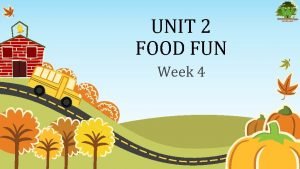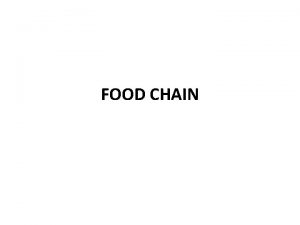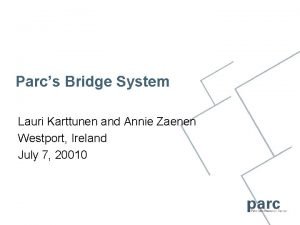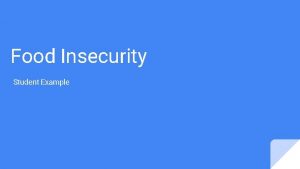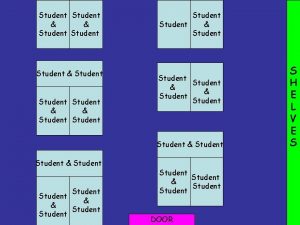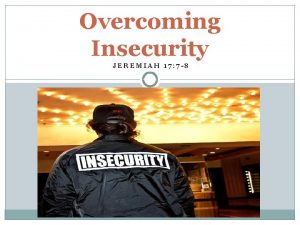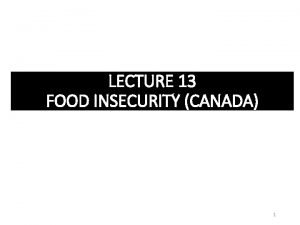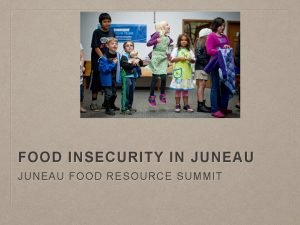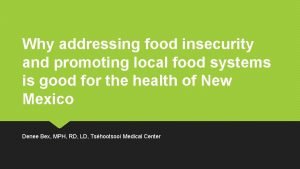Nicole Peterson z npetersonuncc edu Student food insecurity









- Slides: 9

Nicole Peterson z npeterson@uncc. edu Student food insecurity at UNC Charlotte

z 2019 Survey details Focus on student access to food, housing, healthcare, transportation, and computers Building on surveys, interviews, and focus groups from 2015 -present Sent to 6, 000 students in Spring 2019 13% response rate (780 students) 178 questions with skip logic, Average time = 22 minutes Previous: 2015 survey on food insecurity only

z Overview Number of affirmative answers § 32% of students surveyed were food insecure using the USDA measure 0 Number of respondents with this score 260 1 2 3 4 5 6 7 8 9 10 Grand Total 63 38 30 26 22 27 32 16 9 8 531 USDA categories Count Percent High food security Marginal food security 260 49 101 19 Low food security 78 15 Very low food security 92 17 531 100 USDA food security scores (of those who answered the questions, N=531)

z Who is food insecure? § food insecurity rates generally rise over total number of years in school § 38. 6% of non-white students are food insecure, vs 27. 7% of white students § Latino students are significantly more likely to be food insecure – 45. 6% vs 30. 4% of non-Latino students § 42. 1% of students self-declaring a disability are food insecure vs. 27. 7% of those not declaring a disability § Those who have experienced housing insecurity, healthcare denial, loneliness.

z Barriers and challenges Those who are food insecure find it much more difficult to get to the grocery store due to transportation, time, or other factors 18. 71% of respondents did not access support when needed because they believed someone else needed it more, 17. 46% were not sure how to access needed resources, and 12. 68% reported fear or shame preventing them from accessing help

z Other challenges identified in survey: Housing In the past 12 months, did you experience any of the following housing issues? (Please choose all that apply): (585 Respondents, 788 Responses) 21. 03% Borrowed money from friends or family to help pay bills 10. 26% Not able to pay or underpaid your rent or mortgage? § § 71. 93% of students experienced these during the school year, and 32. 16% experienced them over the summer and 19. 88% did over winter break The primary reasons: § lack money (88. 47%) § lack of support by family (22. 35%) § § not knowing about resources (22. 35%) unexpected gaps in housing access (16. 47%) 7. 35% Experienced a rent or mortgage increase that made it difficult to pay rent or mortgage 6. 32% Did not pay the full amount of a gas, oil, or electricity bill 5. 13% Moved in with other people (e. g. couch surf), even for a little while, because of financial problems 3. 08% Lived with others beyond the expected capacity of the house or apartment 2. 91% Have an account default or go into collections due to housing related expenses 2. 39% Did not know where you were going to sleep, even for one night 1. 54% Other 1. 37% Lived in your car, camper, outdoor location, or abandoned building because you had no other place to stay 1. 20% Stayed temporarily at a hotel or motel without a permanent to return to (not on vacation or business travel) 0. 85% Was evicted or thrown out of housing (formally or informally) 0. 17% Receive a summons to appear in housing court? 0. 00% Stayed in a homeless shelter 71. 11% None of the above - I have always had a secure place to stay

z Healthcare access Only 2. 12% of respondents did not have healthcare; 17. 37% had it through UNC Charlotte, while 58. 26% accessed it through their parents. However, 40. 04% report needing medical services but not seeking them, primarily for financial (62. 43%), insurance (47. 62%), or time constraints (48. 15%)

z Digital access Phone 97. 44% of respondents report owning or leasing a smartphone; 92. 52% report that this is fully functional. 27. 56% own or lease a desktop computer, while 94. 66% own or lease a laptop computer (84. 62% report the laptop is fully functional). There are 151 responses about how technological problems have affected their schoolwork. 52. 21% report some delays in their internet speeds in their primary location (usually home), and 28. 54% say they would use the internet more if they could, but they are limited primarily by availability of the internet and time constraints.

z Addressing food and housing insecurity: Taskforce work § Discuss results of survey and other studies § Discuss and implement recommendations from work at UNC Charlotte and elsewhere § Faculty awareness: Syllabus language § Point of contact/hub § Research agenda § Programs: pantry, food recovery, meal plans, spaces § Housing options § Address affordability

